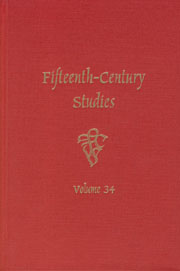Book contents
- Frontmatter
- Contents
- Essays
- 1 The Current State of Research on Late-Medieval Drama. 2007–2008: Survey, Bibliography, and Reviews
- 2 Poetry as Source for Illustrated Prose: The 1519 Strassburg Wigoleis vom Rade
- 3 The St. Edith Cycle in The Salisbury Breviary (c.1460)
- 4 L'épanouissement de l'histoire au quinzième siècle en France
- 5 Escuelas de traducción en la Edad Media
- 6 Ten Poems from the Gruuthuse Songbook (c.1462)
- 7 Louis XI, A French Monarch in Pilgrim's Garb: Badges
- 8 Robert Henryson's Morall Fabilles: Irony, Allegory, and Humanism in Late-Medieval Fables
- 9 Defining Violence in Middle English Romances: Sir Gowther and Libeaus Desconus
- 10 Presencia y Ausencia de los Judíos en los Sermons de quaresma de Vicente Ferrer
- 11 “Als ich dich vor gelert haun”: Conrad Buitzruss's Recipe Collection in Manuscript Clm 671 (Munich)
- 12 Book Reviews
11 - “Als ich dich vor gelert haun”: Conrad Buitzruss's Recipe Collection in Manuscript Clm 671 (Munich)
from Essays
Published online by Cambridge University Press: 05 September 2013
- Frontmatter
- Contents
- Essays
- 1 The Current State of Research on Late-Medieval Drama. 2007–2008: Survey, Bibliography, and Reviews
- 2 Poetry as Source for Illustrated Prose: The 1519 Strassburg Wigoleis vom Rade
- 3 The St. Edith Cycle in The Salisbury Breviary (c.1460)
- 4 L'épanouissement de l'histoire au quinzième siècle en France
- 5 Escuelas de traducción en la Edad Media
- 6 Ten Poems from the Gruuthuse Songbook (c.1462)
- 7 Louis XI, A French Monarch in Pilgrim's Garb: Badges
- 8 Robert Henryson's Morall Fabilles: Irony, Allegory, and Humanism in Late-Medieval Fables
- 9 Defining Violence in Middle English Romances: Sir Gowther and Libeaus Desconus
- 10 Presencia y Ausencia de los Judíos en los Sermons de quaresma de Vicente Ferrer
- 11 “Als ich dich vor gelert haun”: Conrad Buitzruss's Recipe Collection in Manuscript Clm 671 (Munich)
- 12 Book Reviews
Summary
A notebook of Buitzruss, who studied at Heidelberg in the early fifteenth century, illustrates the practical outlook of the city's academic community. Among the varieties of texts preserved in Conrad's collection is a cookbook that has gone unnoticed thus far by scholars of European food history. This set of culinary recipes appears in the midst of general rules about health, ritual magic, and other practically oriented texts taken down by Buitzruss and form a very interesting part of manuscript Clm 671. Any literate reader would gain valuable knowledge for life in a late-medieval urban environment.
In his book Understanding the Middle Ages, Harald Kleinschmidt analyzes visual art and legal documents to trace the development of medieval self-perception and its relationship to action. He describes the growing use of literacy as:
innately pragmatic, as the bulk of existing records show, namely invoices, records of business transactions, private contracts, commercial and other notebooks as well as statistics, although at least during the formative phase of these communities the transmission of technical knowledge, such as techniques of production, was oral in kind.
The power of oral communication to maintain kin groups was supplemented and then replaced by privileging literacy within urban groups, such as the academic community which the student Conrad Buitzruss inhabited at Heidelberg. Incidentally, Kleinschmidt saw the rise of the universities as a further step in the Church's monopolization of knowledge and viewed the written word as its main instrument of power.
- Type
- Chapter
- Information
- Fifteenth-Century Studies , pp. 172 - 184Publisher: Boydell & BrewerPrint publication year: 2009



